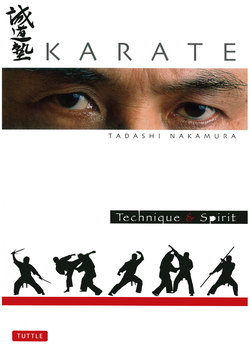Читать книгу Karate Technique & Spirit - Tadashi Nakamura - Страница 7
На сайте Литреса книга снята с продажи.
ОглавлениеFOREWORD
When I think of Shihan Nakamura, I can’t help but recall my first impression: I saw him at Doshinji Monastery in upstate New York and I noticed how gentle he was. It might sound a little strange to say that a person like him, well-accomplished in the martial arts, has a gentle personality. But, despite the extremely difficult and. demanding discipline one goes through, an accomplished martial arts practitioner still shows distinct characteristics of tenderness. For me the pleasure was recognizing his real strength and power behind such flexible qualities. It reminded me of nyunan shin, “gentle, flexible mind.” This word, nyunan, is found in the Lotus Sutra, which reads “with straightforward and yet gentle and flexible mind, wholeheartedly wish to see the Buddha at the risk of one’s own life.” I have no hesitation in saying that Shihan Nakamura is the ideal type: he appears to be gentle and yet there is dynamic strength inside.
He writes, “there is no ‘graduation day’ from the dojo, the place of enlightenment, and so there isn’t the anxiety of racing against a deadline of any kind.” Here I see his wonderful insight and understanding. It is not only the general principle of any well-refined way such as the ways of tea ceremony, flower arrangement, calligraphy, as well as of the martial arts kendo, judo, aikido, kyudo and karate, but also it is the basic principle of Zen that constant, unceasing practice is essential to the realization of life in each moment. We have no day of graduation but the continuation of renewed life.
Let’s listen further to what he says. “Karate-do’s essence, however, is totally removed from the notion of winners and losers, trophies and prizes—the students’ real opponent is the self.” I see a certain parallel in expression to the Zen Master Dogen, founder of the Soto Zen school in Japan. He writes, “To study the enlightened way is to study the self. To study the self is to forget the self. To forget the self is to be enlightened by myriads of dharmas. And to be enlightened by myriads of dharmas is to free one’s body and mind as well as that of others. There is traceless enlightenment; allow this traceless enlightenment to continue forever.”
The word “karate” itself has a very interesting and yet profound implication. It means “empty hand.” We tend to want to grab something, but hold onto it. In a way, it is nice to hold something, but at the same time it obviously restricts the use of the hand. We know that being empty-handed we can use the hand any way we want. But how and how much do we appreciate such freedom and the potential of what the empty hand can do? Karate-do, as the way of empty-handedness, symbolizes the way of freedom and total liberation, not only of oneself but also as the key to establishing a harmonious life both internally and externally.
We are living in an environment where the culture has developed into an extremely mechanized, divided and automated society. This tendency might develop further, but at the same time we hear more and more warnings against such tendencies. I hope those who are interested in practicing karate-do will find harmonious, well-balanced life through the continuous practice of the wisdom and physical discipline of empty hand.
Hakuyu Taizan Maezumi, Roshi
